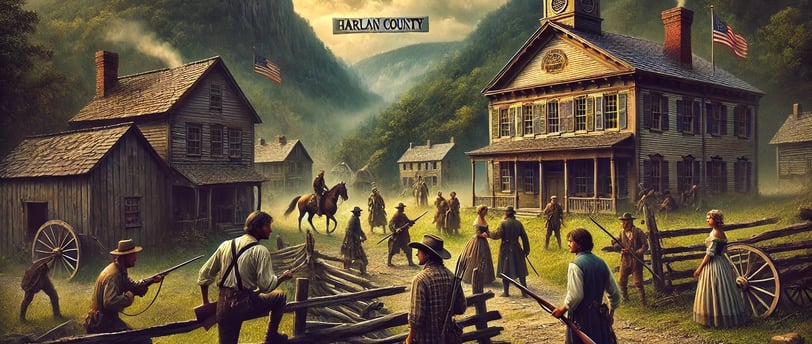life in harlan
The Forgotten Feud: The Bloody Battle of Harlan County
10/20/2024


When we talk about feuds in Appalachia, most people's minds immediately jump to the infamous Hatfields and McCoys. But the Hatfield-McCoy feud was far from the only conflict that plagued the mountains of Appalachia. In fact, feuds between families over power, politics, and resources were common, particularly in the years following the Civil War. One such feud—the Howard-Turner Feud—took place in Harlan County, Kentucky, over a hundred years ago, and its bloody legacy has etched the name "Bloody Harlan" into history.
Harlan County’s Humble Beginnings
Harlan County traces its roots to the late 18th century when Samuel and Chloe Howard, early settlers, arrived in the region after passing through the Cumberland Gap. Established in 1819, Harlan County took its name from Kentucky pioneer Silas Harlan. The Howards, one of the founding families, were known as law-abiding citizens, building the first courthouse and jail. Meanwhile, the Turners, another prominent family, amassed wealth through farming and business ventures.
These two families seemed to live peacefully for a time, but tensions simmered beneath the surface. After the Civil War, which had already deeply divided the region, those tensions finally exploded into violence.
The First Sparks of Conflict
The feud between the Howards and the Turners erupted in 1884, when George Britton Turner, a towering figure in Harlan County, built the opulent Turner Mansion. But George wasn’t the troublemaker of the family—that title belonged to his brother, James "Devil Jim" Turner, whose life was filled with rebellion, violence, and chaos. Devil Jim, a former Union soldier turned guerrilla fighter, was infamous for his lawless ways, robbing and terrorizing Confederate sympathizers during and after the war.
But the feud truly began not with Devil Jim, but with a simple poker game between Wilkerson "Wix" Howard and Bob Turner, son of George Turner. The game escalated into a deadly gunfight, with Wix Howard killing Bob Turner in what was later ruled as self-defense. Though Wix turned himself in and was acquitted, this wasn’t the end—it was just the beginning.
A Cycle of Bloodshed
The Turners were not about to let Bob’s death go unavenged. Just weeks later, Bob's brother, Little George Turner, confronted the Howards, fueling a bitter back-and-forth of violence. Gunfights broke out on the streets of Harlan, culminating in a brutal shootout at the courthouse in 1889, where Little George was shot dead.
What followed was a cycle of retaliation that consumed the county. Families picked sides, and Harlan was caught in the crossfire. Judge Wilson Lewis, a relative of the Turners and an outspoken opponent of the Howards, called on the Kentucky governor for militia support, desperately trying to bring law and order back to the region. But Governor Simon Bolivar Buckner refused, telling the judge that local authorities needed to handle the situation themselves.
Feud or Anarchy?
Despite Judge Lewis’s repeated requests for help, the governor stood firm, claiming that it wasn’t the state's responsibility to intervene in local matters. This refusal only escalated the violence. As gunfights and killings became routine, Harlan County residents were forced to live in a state of constant fear. The Howards, determined to protect themselves, organized a group of 25 men to face off against the Turners, but peace remained elusive.
The situation grew so dire that by the summer of 1889, Governor Buckner finally relented and sent in the militia. But the soldiers were given strict orders to protect the courthouse and not to intervene in the feud—a move that many saw as too little, too late.
A Letter to the Governor
At the height of the violence, Wills Howard and Will Jennings, key figures in the Howard clan, sent a letter to the governor. It was not a plea for mercy but a condemnation of the state’s refusal to take action. The letter, dripping with defiance, accused Judge Lewis and his “bushwhackers” of turning Harlan into a lawless battleground and insisted that the Howards were merely defending themselves from an oppressive system.
As the letter circulated, it became clear that neither side was willing to back down. The Howards saw themselves as victims of a corrupt political machine, while the Turners, with Judge Lewis in their corner, viewed the Howards as outlaws who needed to be wiped out. And so, the bloodshed continued.
The Aftermath
By 1893, Wills Howard found himself in California, where he was arrested for robbing a Wells Fargo stagecoach. Eventually, he was sent back to Missouri to face trial for the murder of a deaf man and was hanged for the crime. The feud slowly burned itself out after that, but the damage had been done.
The Howard-Turner Feud left a lasting mark on Harlan County. While time may have cooled the passions that once fueled this deadly conflict, the term "Bloody Harlan" has stuck, a reminder of the days when family feuds tore the region apart.
Today, Harlan County is remembered not just for its coal mining history or its labor struggles, but also for the violent feuds that shaped its legacy. The story of the Howard-Turner Feud is just one chapter in Appalachia's long, turbulent history—a chapter written in blood.
